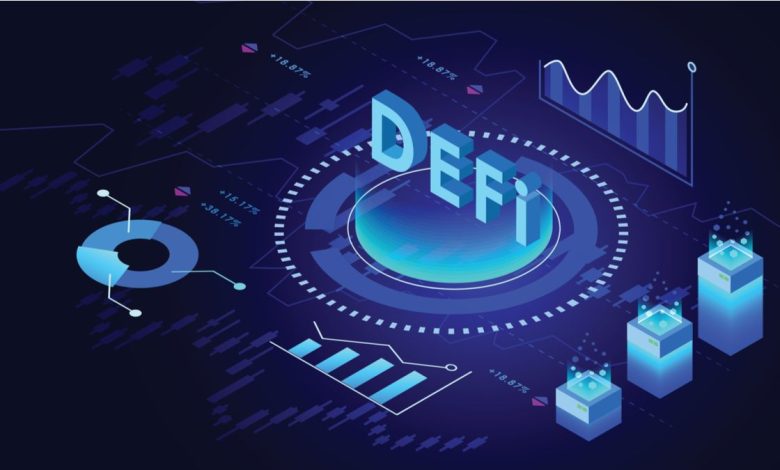The Basics of Decentralized Finance (DeFi)

- Understanding the concept of Decentralized Finance
- The key principles behind DeFi
- Exploring the benefits of decentralized finance
- How DeFi is revolutionizing the traditional financial system
- Popular DeFi platforms and protocols to know
- Challenges and risks associated with DeFi
Understanding the concept of Decentralized Finance
Decentralized Finance, or DeFi, is a concept that is gaining traction in the world of finance. It refers to a system where financial transactions are conducted without the need for traditional intermediaries such as banks or financial institutions. Instead, DeFi relies on blockchain technology to create a decentralized network where users can interact directly with each other.
One of the key principles of DeFi is the idea of financial inclusion, where anyone with an internet connection can access financial services. This is in contrast to traditional finance, which often excludes individuals who do not have access to banking services. By using blockchain technology, DeFi aims to create a more open and accessible financial system for everyone.
In a decentralized finance system, users can access a wide range of financial services, including lending, borrowing, trading, and investing, all without the need for a central authority. This is made possible through the use of smart contracts, which are self-executing contracts with the terms of the agreement directly written into code.
Overall, the concept of decentralized finance is revolutionizing the way we think about traditional financial systems. By leveraging blockchain technology and smart contracts, DeFi is creating a more inclusive and accessible financial system that empowers individuals to take control of their own finances.
The key principles behind DeFi
Decentralized Finance (DeFi) operates on several key principles that set it apart from traditional financial systems. These principles are essential to understanding how DeFi works and why it has gained popularity in recent years.
- Decentralization: DeFi platforms are built on blockchain technology, which allows for transactions to be conducted without the need for intermediaries such as banks or financial institutions. This decentralization ensures that users have full control over their assets and can interact with the platform directly.
- Transparency: Transparency is a fundamental aspect of DeFi, as all transactions are recorded on the blockchain and can be viewed by anyone. This level of transparency helps to build trust among users and ensures that the system is operating fairly.
- Interoperability: DeFi platforms are designed to be interoperable, meaning that different applications and protocols can work together seamlessly. This allows for a wide range of financial services to be offered within the DeFi ecosystem.
- Accessibility: DeFi aims to make financial services accessible to anyone with an internet connection, regardless of their location or financial status. This inclusivity is a key driver behind the growth of DeFi and its potential to revolutionize the traditional financial system.
- Security: Security is a top priority in DeFi, with platforms implementing various measures to protect user funds and data. Smart contracts, audits, and other security protocols help to minimize the risk of hacks and fraud.
Exploring the benefits of decentralized finance
Decentralized finance (DeFi) offers a wide range of benefits that traditional financial systems cannot match. By leveraging blockchain technology, DeFi provides users with greater control over their assets and financial activities. Let’s explore some of the key advantages of decentralized finance:
- Transparency: DeFi operates on public blockchains, allowing anyone to verify transactions and track the movement of funds. This level of transparency helps to build trust among users and reduces the risk of fraud.
- Security: Blockchain technology ensures that DeFi platforms are highly secure and resistant to hacking. Smart contracts, which automate transactions based on predefined conditions, add an extra layer of security to the system.
- Accessibility: DeFi eliminates the need for intermediaries such as banks or brokers, making financial services more accessible to a global audience. Users only need an internet connection to participate in DeFi activities.
- Lower Costs: Traditional financial services often come with high fees and hidden charges. DeFi, on the other hand, operates on a peer-to-peer basis, reducing costs for users and increasing efficiency in the system.
- Financial Inclusion: DeFi has the potential to bring financial services to underserved populations who lack access to traditional banking systems. By using DeFi platforms, individuals can participate in lending, borrowing, and other financial activities.
Overall, decentralized finance offers a more democratic and inclusive financial system that empowers individuals to take control of their finances. As the DeFi ecosystem continues to grow and evolve, we can expect to see even more innovative solutions that benefit users around the world.
How DeFi is revolutionizing the traditional financial system
Decentralized Finance (DeFi) is transforming the traditional financial system by leveraging blockchain technology to create a more open, transparent, and accessible ecosystem. Unlike traditional finance, which relies on centralized institutions like banks and governments to facilitate transactions, DeFi operates on decentralized networks that are not controlled by any single entity.
One of the key ways in which DeFi is revolutionizing the financial system is through the use of smart contracts. These self-executing contracts are coded to automatically enforce and execute the terms of an agreement when certain conditions are met. This eliminates the need for intermediaries, reduces the risk of fraud, and increases the efficiency of transactions.
Another way in which DeFi is disrupting traditional finance is by enabling peer-to-peer lending and borrowing. Through decentralized lending platforms, individuals can lend their assets to others in exchange for interest, without the need for a bank or other financial institution to facilitate the transaction. This opens up new opportunities for individuals to access credit and earn passive income.
Furthermore, DeFi is democratizing access to financial services by allowing anyone with an internet connection to participate in the ecosystem. This is particularly beneficial for individuals in underserved or unbanked regions who may not have access to traditional banking services. By using DeFi platforms, these individuals can securely store their assets, access loans, and engage in trading and investing activities.
Popular DeFi platforms and protocols to know
When it comes to DeFi platforms and protocols, there are several popular options that have gained significant traction in the decentralized finance space. These platforms offer a wide range of services, from lending and borrowing to decentralized exchanges and asset management. Here are some of the key DeFi platforms and protocols to know:
- Compound Finance: Compound is a decentralized lending platform that allows users to lend out their crypto assets and earn interest on them. It also enables borrowers to take out loans by using their crypto assets as collateral.
- Uniswap: Uniswap is a decentralized exchange (DEX) that allows users to swap various ERC-20 tokens directly from their wallets. It uses an automated market maker (AMM) system to facilitate trades without the need for order books.
- Aave: Aave is a decentralized lending platform that offers a wide range of borrowing and lending options for users. It also allows users to earn interest on their deposits through a feature called “aTokens.”
- MakerDAO: MakerDAO is a decentralized autonomous organization (DAO) that issues the stablecoin DAI. Users can generate DAI by locking up collateral in the form of Ether (ETH) and other tokens.
- Synthetix: Synthetix is a decentralized platform that allows users to mint synthetic assets that track the value of real-world assets like fiat currencies, commodities, and cryptocurrencies.
These DeFi platforms and protocols have revolutionized the way people interact with financial services by providing a permissionless and censorship-resistant alternative to traditional finance. As the DeFi ecosystem continues to grow, it’s essential to stay informed about the latest developments and opportunities in this rapidly evolving space.
Challenges and risks associated with DeFi
There are several challenges and risks associated with DeFi that users should be aware of before diving into this innovative financial ecosystem. While DeFi offers numerous benefits, it also comes with its own set of potential pitfalls.
- Smart contract vulnerabilities: One of the main risks of DeFi is the potential for smart contract bugs or exploits. Since DeFi platforms are built on smart contracts, any vulnerabilities in the code can be exploited by malicious actors to steal funds.
- Regulatory uncertainty: The regulatory landscape surrounding DeFi is still evolving, which can create uncertainty for users. As governments around the world grapple with how to regulate DeFi, there is a risk that new regulations could impact the operation of DeFi platforms.
- Market volatility: DeFi assets are often highly volatile, which can lead to significant price fluctuations. Users should be prepared for the possibility of large swings in the value of their investments.
- Lack of consumer protection: Unlike traditional financial institutions, DeFi platforms do not offer the same level of consumer protection. If something goes wrong, users may have limited recourse to recover their funds.
- Centralization risks: While DeFi is designed to be decentralized, there are still risks of centralization, particularly in governance structures. If a small group of users or entities control a DeFi platform, it can undermine the principles of decentralization.
It is important for users to carefully consider these challenges and risks before participating in DeFi to ensure they are making informed decisions about their financial activities in this rapidly evolving space.



